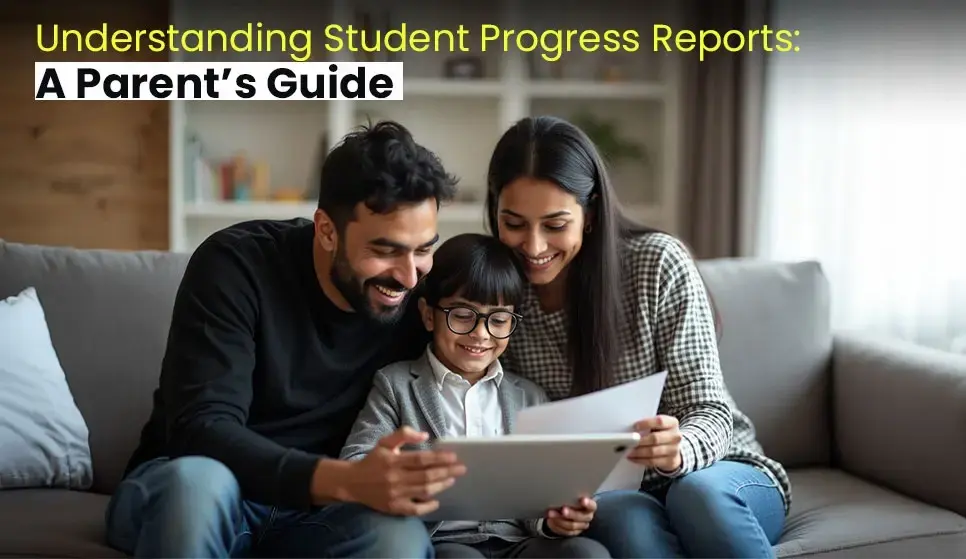Ever Looked at Your Child’s Report Card and Thought, “What Does This Really Mean?
You’re not alone. A report card is more than just a list of grades—it’s a snapshot of your child’s academic journey, personal development, and classroom engagement. But when grade scales or unfamiliar terms pop up, it’s easy to feel overwhelmed.
Parents who didn’t grow up with today’s grading system or parents less acquainted with current academic scales usually just nod along to what the teacher says or see if their kid has passed. They don't tell the teacher they aren’t familiar with the modern grading system to avoid any sort of discomfort.
Let’s walk through how to understand your child’s report card, what the grades really mean, and how you can use this info to support your child in a positive way.
Why do report cards seem confusing to parents?
Different Grading System:Many schools have their respective grading systems that are different from the ones used in other schools, which makes it difficult to understand.
Lack of Context: That math grade? It only reflects one part of your child’s school life. Your child might shine in group projects, class discussions, or creative subjects like art or drama—but those things don’t always show up clearly on a report card.
Emotional reaction:Let’s be honest—report cards can stir up big feelings like Pride, worry, confusion, even frustration. That’s completely normal. What matters most is what we do with that information.
How to understand academic performance
Ask the teacher: It is very common to discuss with teachers regarding the grading system. It might seem a bit out of comfort zone or seem awkward for some, that’s completely normal! Teachers welcome questions and are happy to help.
Understand on what basis the grading is done: In some schools, marks come from tests only. In others, teachers look at classwork, homework, participation, group work, and even behavior. Ask your child’s school what counts toward grades.
Pay Attention to Teacher Feedback: Understand what the teacher is saying about your kid. Focus on the points that the teacher thinks are important and help your children with those points.
Learning from the report card
Set the Right Tone:Avoid making report card days the most important part of your life. Approach it as a normal day.
Celebrate Small Wins: Did your child do better in one subject? Improve handwriting? Get more confident reading aloud? All wins deserve a little high-five or celebration.
Focus on Problem-Solving:Rather than scolding your kids on how they did in this exam, focus on how you can improve them in the next semester.
Collaborate with Teachers to get better
Schedule Follow-Ups:If something feels unclear or worrying, you can always ask for a follow-up meeting. Teachers are more than happy to talk it through.
Ask About Resources: Ask if there are any school-based tutoring programs or behavioural coaching.
Stay Connected: Stay connected with the teacher even after the report card meeting, and ask them frequently how your child is doing.
Creating a Home Learning Strategy Based on Report Card Insights
Stay Involved in Learning: After the kids get home, ask them what they learned at school that day.
Help your child study: Helping your child study helps them ask questions about the problems they have while doing the homework.
Home tutoring: If a subject is really challenging, having a home tutor can help. Bonus: You can learn how your child studies, too!
Conclusion
Sometimes, it can be hard for children to get good marks due to reasons like bad health just before the exams, not getting enough time to revise, or not having a great tutor, but that doesn't mean that the child is not good at their overall academics.
If any doubts arise, you can always ask the teacher; there is no reason for you to feel uncomfortable while asking. Also, take frequent updates on how your child is doing in school from the teacher because the teacher's opinion matters.
Also, Report cards are tools, not fate. Use them to support your child's growth, set goals, and remind your child that effort matters more than perfection.
Contact us to know more about how your child can get better in their overall academics.
FAQs:
1. Why does my child’s school use a different grading system than I did?
Schools today use diverse grading models—like letter grades, number scales, rubrics, or standards-based assessments—to better reflect student learning beyond just test scores.
2. What should I focus on besides the letter grade?
Look for teacher comments, progress indicators, and performance in areas like participation, projects, or social skills to get a complete picture of your child’s development.
3. My child scored low; does that mean they’re failing overall?
Not necessarily. One low grade doesn’t define overall performance. Consider consistency across subjects, effort, and feedback from teachers before jumping to conclusions.
4. Can I ask the teacher to explain the grading system?
Absolutely. Teachers expect and welcome questions from parents. Understanding the grading helps you better support your child.
5. How do I know if my child needs extra help?
If the report card shows a downward trend or repeated struggles in specific areas, it's a good idea to speak with the teacher and consider additional support like tutoring.
6. Should I be worried if my child’s grades are average or just passing?
Average grades are not a bad sign. What matters more is effort, growth over time, and developing strong study habits.
7. How can I support my child at home based on the report card?
Set small academic goals, create a consistent homework routine, and stay engaged with what they’re learning.
8. What should I do if I disagree with something on the report card?
Schedule a meeting with the teacher to clarify your concerns. Be open to dialogue and solutions.
9. Are extracurricular achievements included in report cards?
Some schools include comments or grades for extracurriculars, while others may track them separately. Ask your school how these are reported.
10. How often should I talk to the teacher about my child’s progress?
Regular check-ins every few months or after each grading period help you stay updated and proactively address any issues.


